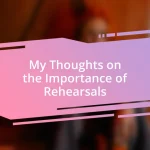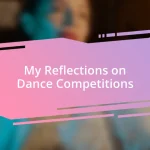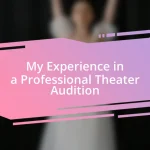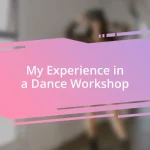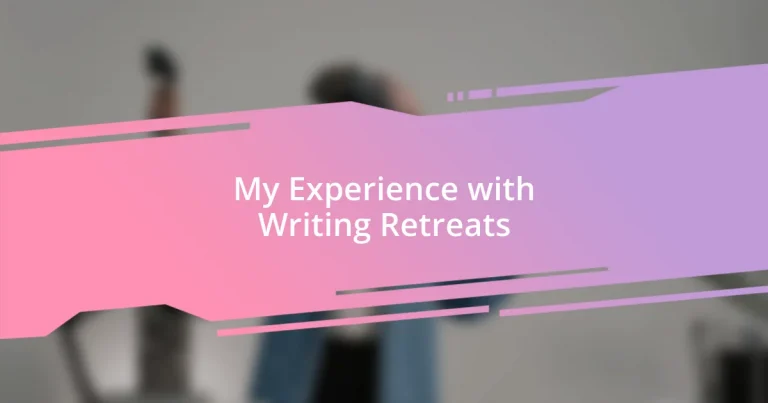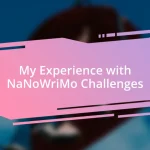Key takeaways:
- Writing retreats offer a supportive community and focused time for creativity, helping writers reconnect with their craft and boost productivity.
- Choosing the right retreat involves considering structure, environment, and the diversity of attendees to enhance the creative experience.
- Challenges such as self-doubt, social dynamics, and unpredictable surroundings can arise during retreats, requiring balance and adaptability from participants.
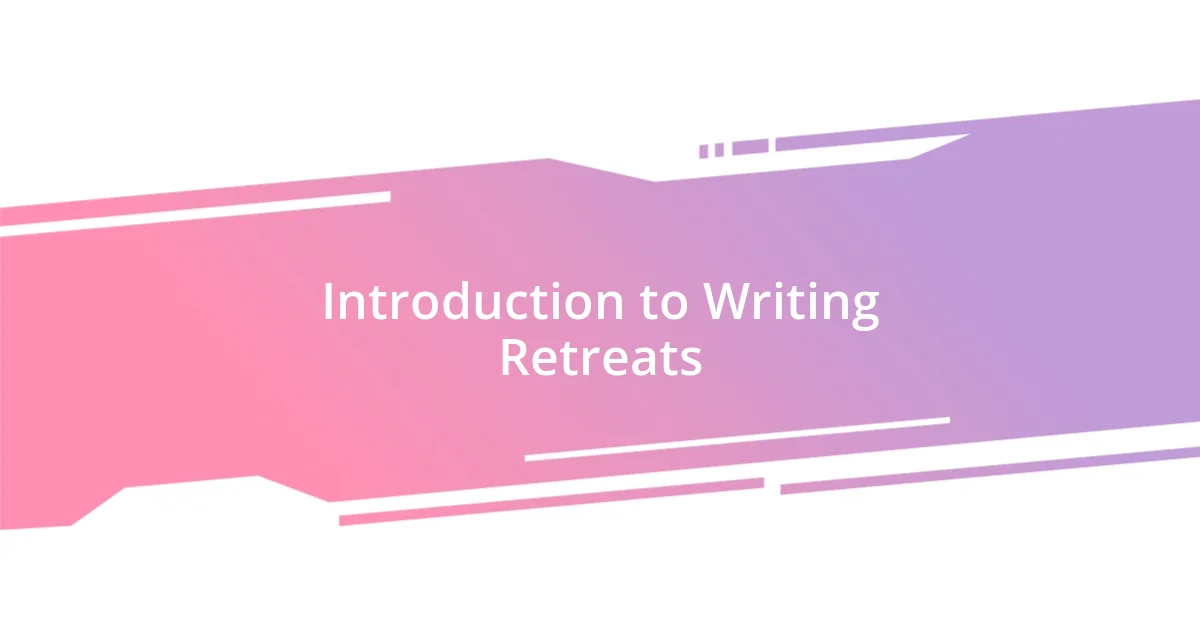
Introduction to Writing Retreats
Writing retreats are unique havens for writers seeking to immerse themselves in their craft away from daily distractions. I still remember my first retreat; the excitement surged through me as I envisioned days filled with creativity, surrounded by fellow writers. Have you ever felt that spark of inspiration that transforms a blank page into a tapestry of ideas?
These retreats offer not just a change of scenery but a chance to tap into a community of like-minded individuals. I often found myself deep in conversations during meals, exchanging thoughts and feedback that reignited my passion for storytelling. It made me wonder: how does being in a supportive environment amplify our creative voices?
What truly sets writing retreats apart is their structured time dedicated to writing, reflection, and connection. Each day might include guided workshops, one-on-one feedback sessions, or simply quiet hours where ideas flow uninterrupted. I’ve found that these moments, often spent in nature or cozy cabins, provide an unmatched clarity that can be hard to find in our day-to-day lives. Isn’t it fascinating how stepping away can actually bring us closer to our true voices?
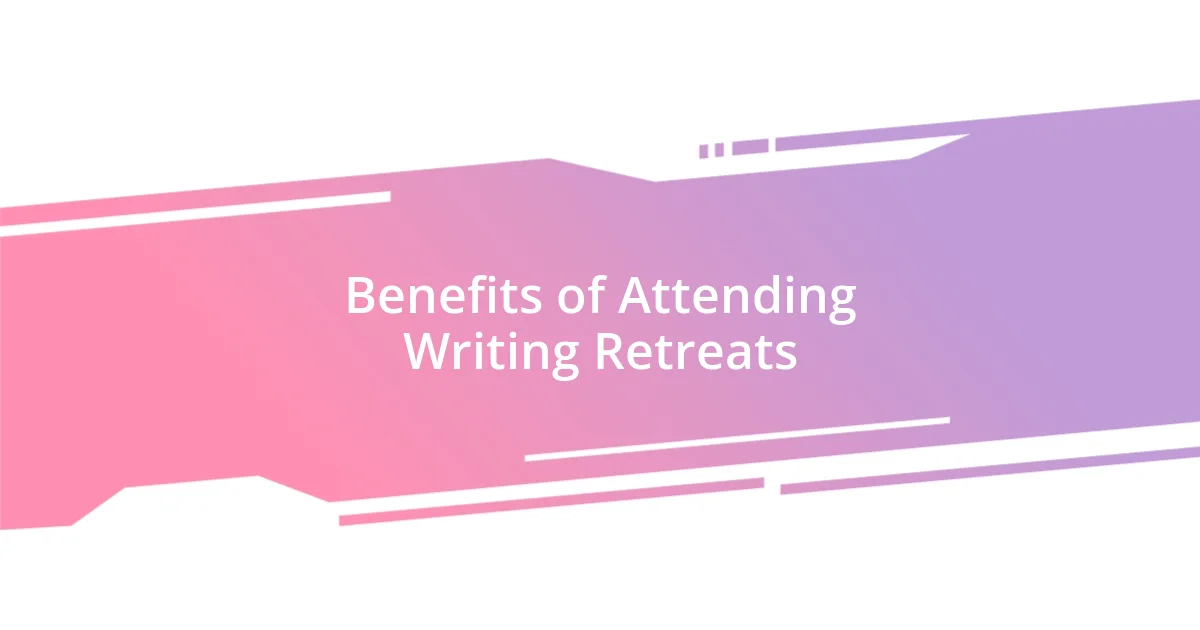
Benefits of Attending Writing Retreats
Attending a writing retreat has been one of the most rewarding experiences in my writing journey, and I can’t emphasize enough the focus it provides. When I arrive, there’s an enchantment in the air—everyone is there with a shared purpose. During one retreat, I remember sitting on a sun-drenched porch, feeling the gentle breeze while my ideas flowed freely onto the page, unhindered by the usual distractions of life. It’s a blend of solitude and community that sparks creativity in ways you might not expect.
Here are some benefits I’ve personally experienced from attending writing retreats:
- Enhanced Productivity: The dedicated time for writing allows you to produce more work in a short period than you typically would at home.
- Constructive Feedback: Sharing your work with fellow writers creates an invaluable opportunity for constructive criticism and fresh perspectives.
- Cultivation of New Relationships: I’ve forged lasting friendships with fellow attendees, which often lead to continued support and collaboration after the retreat ends.
- Deepened Connection with Craft: The immersive environment fosters a renewed passion for writing, allowing you to reconnect with your creative self.
- Mindfulness and Reflection: Many retreats incorporate moments of reflection and mindfulness, helping you to discover deeper themes in your writing.
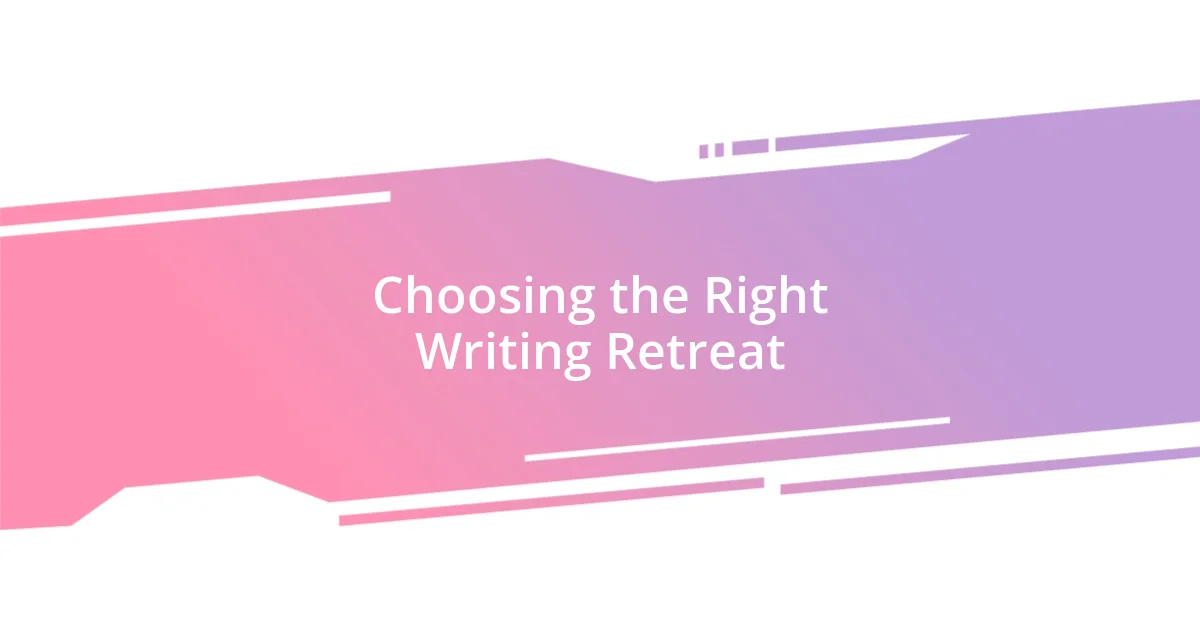
Choosing the Right Writing Retreat
Choosing the right writing retreat can feel like trying to find the perfect pair of shoes; it’s all about fit and comfort. I remember when I chose my first retreat, I focused heavily on the location, thinking a serene lakeside would inspire my best writing. However, I soon realized the retreat’s structure and the facilitator’s expertise were just as critical. Have you considered what environment truly fuels your creativity?
Another important aspect is the type of attendees. I once attended a retreat where the participants had vastly different writing styles, and it turned out to be a blessing. The diversity of perspectives not only enriched the discussions but also challenged me to think outside my usual narrative frames. So, what kind of creative community do you envision yourself thriving in?
Lastly, don’t forget to look into the retreat’s schedule. I recall one retreat where every hour was meticulously planned, leaving little room for spontaneous creativity. I found myself craving unstructured time to allow ideas to simmer naturally. Balancing guided activities with free time is essential to keep the creative juices flowing. What’s your ideal blend of structure and freedom in a writing retreat? It’s a decision that can shape your overall experience.
| Criteria | Retreat A | Retreat B |
|---|---|---|
| Location | Lakeside | Mountain Cabin |
| Focus | Novel Writing | Poetry and Memoir |
| Duration | Weekend | Weeklong |
| Workshop Style | Guided | Open Discussion |
| Community | Beginner Writers | Mixed Experience Levels |
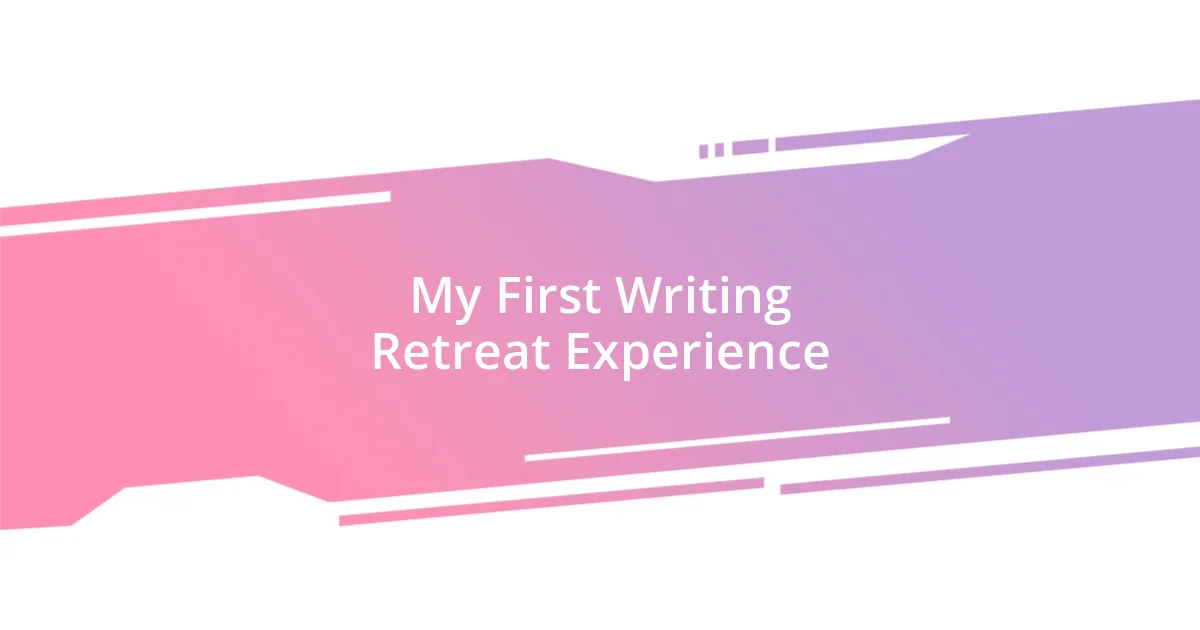
My First Writing Retreat Experience
I was both nervous and excited as I drove to my first writing retreat. The landscape unfolded like a beautiful canvas, but what stuck with me the most was the anticipation in my chest. Would I fit in? Would the other writers resonate with my style? As I settled into my cozy cabin, those doubts began to fade, replaced by a vibrant energy that thrummed in the air.
During the first evening’s gathering, we all shared our writing dreams and fears. I recall how revealing my own aspirations felt like peeling away layers of an onion—layer after layer, there was more depth to uncover. The feeling of vulnerability was palpable, yet so empowering. Have you ever felt that rush when you finally connect with others who share your passion? It was in those moments that I realized I wasn’t alone on my journey.
The next morning, with my coffee in hand, I found myself wandering to a quiet spot by the lake. The sun peeked through the trees, and as the soft sounds of nature enveloped me, inspiration sparked within. I started jotting down ideas, and to my surprise, I was writing without the usual self-doubt that had lingered at home. That weekend, I discovered that sometimes all it takes is a change of scenery to illuminate your creative path. What could a new environment unveil for you?
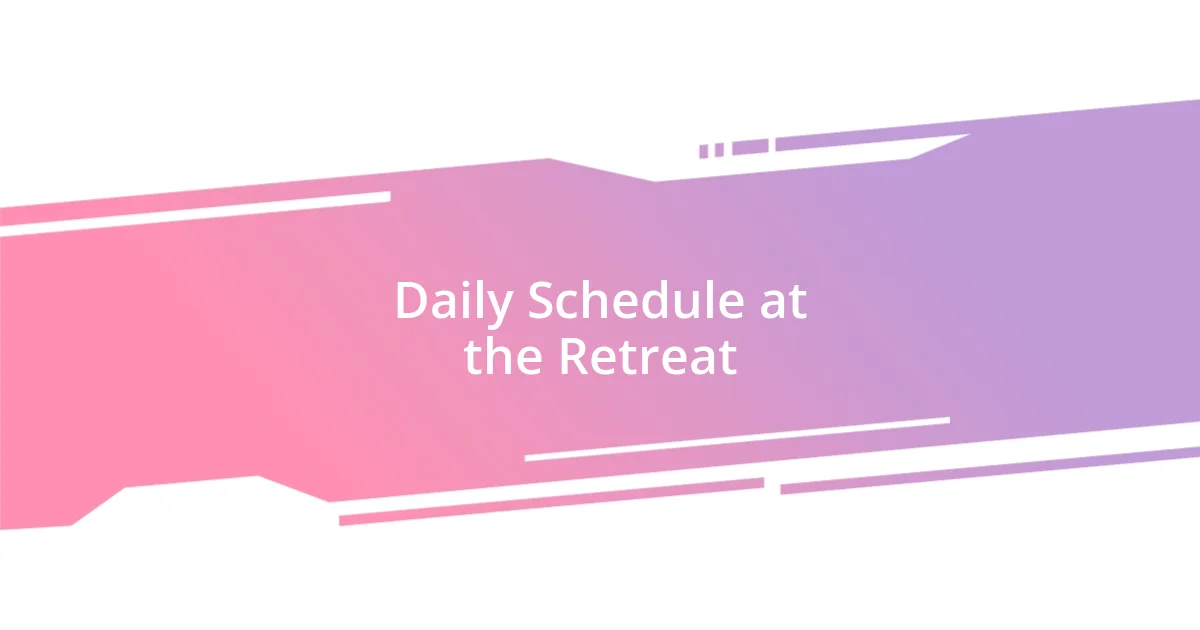
Daily Schedule at the Retreat
The daily schedule at my writing retreat was a delightful blend of inspiration and structure. Each morning, we kicked off with a group session that sparked much-needed motivation. I vividly remember that first session—the facilitator kicked things off with a powerful quote that seemed to resonate with every writer in the room. It set a reflective tone for the day, and I often found myself pondering the quote long after the session ended.
In the afternoons, we had dedicated writing blocks that allowed us to dive deeply into our projects. I cherished those quiet hours, often surrounding myself with notebook and laptop under a sprawling oak tree. The gentle rustling of leaves became my soundtrack, and there, I remember losing track of time as my fingers flew across the keyboard. Isn’t it amazing how certain environments can channel creativity? I realized that uninterrupted time was a luxury I rarely afforded myself at home.
Evenings brought us back together for sharing circles, where we discussed our progress and offered feedback. I was surprised by how supportive everyone was; it felt like a safe space for both nerves and triumphs. Listening to others share their fears and breakthroughs opened my eyes to the power of community. Have you ever experienced the thrill of sharing your work with an eager audience? That feeling of connection and understanding really fueled my writing journey throughout the retreat.
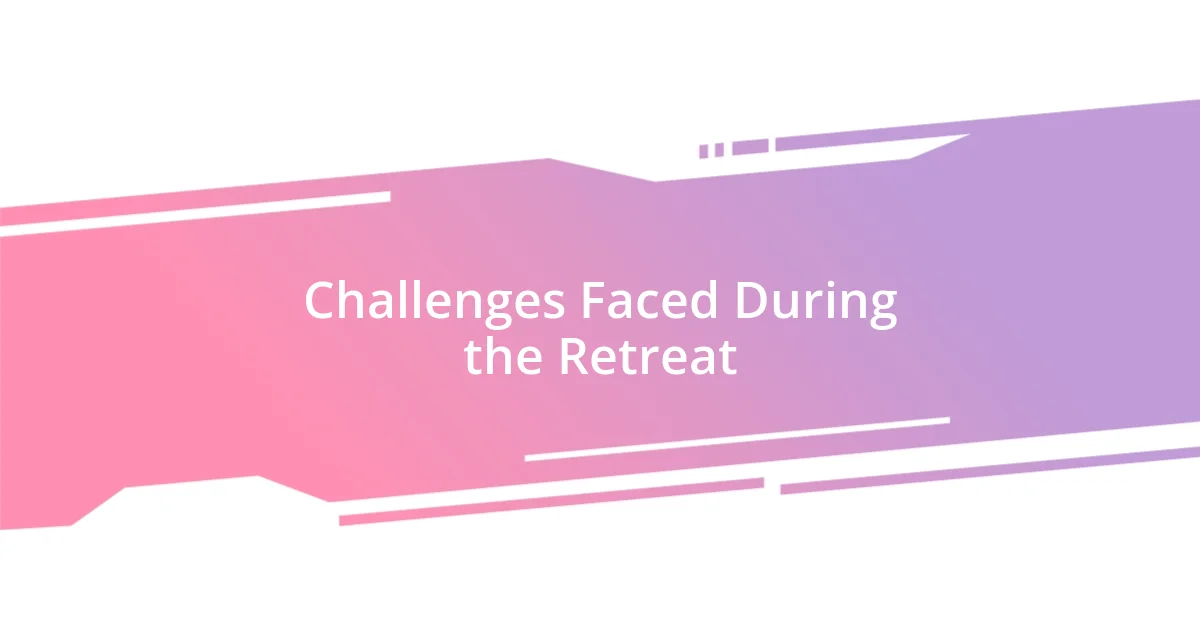
Challenges Faced During the Retreat
As I dove into my days at the retreat, I quickly realized that challenges were lurking in the corners. The initial excitement began to morph into a kind of pressure. I remember staring at my blank pages during those designated writing hours, feeling the weight of expectations. It can be daunting when you’re surrounded by talented individuals, and I found myself grappling with self-doubt. Have you ever faced that moment where inspiration seems just out of reach?
Another challenge I encountered was the balancing act of social interaction and personal time. While the bonding moments were magical, I sometimes struggled to carve out the alone time I desperately needed to focus on my writing. I recall one particular evening, feeling overwhelmed by lively conversations and laughter. It was delightful, but I longed for a quiet moment to process my thoughts. How do you find that equilibrium between connection and solitude in creative spaces?
Finally, the retreat setting, while picturesque, posed its own hurdles. The tranquil nature setting was sometimes interrupted by unexpected weather changes—like that stormy night when heavy rain pelted the cabin roof. It was cozy at first, but I soon realized it disrupted my planned writing sessions. I had to adapt and find new inspiration amid the chaos. Do you think the unpredictable elements of our environments can enhance our creativity or stifle it? I believe it really depends on our ability to pivot and embrace the unexpected.
